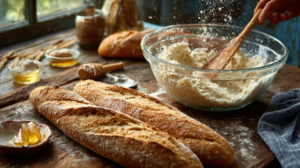There’s something undeniably magical about the aroma of freshly baked French baguettes wafting through your kitchen. Crisp and golden on the outside, soft and chewy on the inside—this classic bread is a staple in French cuisine and beloved worldwide.
In this comprehensive guide, you’ll learn step-by-step how to make traditional French baguettes at home using simple ingredients, the right tools, and tried-and-true techniques that create bakery-quality results every time.
Table of Contents
What is a French Baguette?
A baguette is a long, slender loaf of bread known for its crisp crust and airy interior. While it seems simple, its texture, flavor, and shape are the result of careful technique and patience. Surprisingly, a traditional baguette contains only four basic ingredients: flour, water, yeast, and salt.

Yet, even with the same ingredients, no two baguettes are alike—proof that bread-making is both a science and an art.
A Brief History of the Baguette
Historically, French bakers used natural leavening methods (sourdough starters) to make bread. As modern baking evolved, commercial yeast became more common, making the bread-making process faster but slightly altering the flavor and structure.
Today, most bakeries use baker’s yeast, but artisan bakers continue to experiment with long fermentation methods to develop richer flavor and better texture.
Key Factors That Influence the Final Loaf
The final look and taste of a baguette depend on more than just ingredients. These variables make a huge difference:
-
Fermentation Time: Slow fermentation (cold retardation) improves flavor.
-
Dough Hydration: Higher water content leads to a lighter, airier crumb.
-
Shaping and Scoring: Proper techniques affect rise and crust formation.
-
Oven Heat and Steam: High heat and steam create that iconic crust.
The Method Behind Perfect Baguettes (Inspired by Anis Bouabsa)
This method is adapted from award-winning Parisian baker Anis Bouabsa, known for his 2008 win of Best Baguette in Paris. His process includes:
-
High hydration (75%)
-
Minimal yeast
-
No-knead method
-
Cold fermentation for 21 hours
-
Very hot oven for maximum rise
Ingredients You’ll Need
-
500 g all-purpose flour (King Arthur brand is ideal)
-
360 g water (room temperature)
-
10 g salt
-
3 g instant yeast (Quick Rise or Rapid Rise)
-
25 g honey (optional but adds a subtle sweetness)

Tip: Always measure ingredients with a kitchen scale for best results.
Equipment You’ll Need
To achieve bakery-level baguettes, these tools are highly recommended:
-
Thick baking stone or Cordierite kiln shelf (for even heat distribution)
-
Baker’s couche (linen proofing cloth to support baguette shape)
-
Bread lame or razor blade (for precise scoring)
-
Pizza peel or parchment paper (for safe oven transfer)
-
Steam tray with rolled towel (to provide consistent steam)
Step-by-Step French Baguette Recipe
1. Mix the Dough
In a large bowl, combine flour, water, yeast, salt, and honey. Stir until fully incorporated. Cover and let it rest for 15 minutes.
2. Stretch and Fold (3 Rounds)
Over the next 90 minutes, perform three sets of stretch and folds:
-
Gently stretch one side of the dough and fold it over itself.
-
Rotate the bowl and repeat for each side.
-
After each round, flip the dough upside down.
Let it sit in a warm room to activate the yeast. The dough should develop small blisters and smell slightly tangy.
3. Cold Retard the Dough
Cover the bowl with plastic wrap or a damp cloth and place it in the refrigerator for 12–14 hours. This cold fermentation develops deeper flavor.
If the dough hasn’t doubled after refrigeration, leave it out at room temp for an additional hour or two.
4. Preheat the Oven
Start preheating your oven to 500°F (260°C):
-
Place a baking stone in the upper part of the oven.
-
On the lower rack, add a metal pan with hot water and a rolled towel for steam.
Steam is crucial for developing a crispy crust and great oven spring.
5. Shape the Baguettes
Turn the chilled dough onto a floured surface. Divide it into three equal portions.
-
Gently press each into a rectangle.
-
Fold one long edge inward and seal the seam.
-
Repeat two more folds, forming a cylinder.
-
Roll each cylinder to about 14–15 inches in length.
6. Proof the Dough
Place the baguettes seam-side up on a floured baker’s couche. Dust with a mix of all-purpose and rice flour to prevent sticking.
Let them proof at room temperature for 30 to 60 minutes. A slow, partial spring-back after a gentle finger press means they’re ready.
7. Score the Baguettes
Transfer the loaves seam-side down onto parchment paper. Using a bread lame or razor blade, make three diagonal slashes per baguette with swift, clean cuts.
Scoring allows the bread to expand properly in the oven.
8. Bake with Steam
Carefully slide the parchment with the baguettes onto the hot baking stone. Be cautious—steam can burn!
Immediately reduce oven temperature to 475°F (245°C). Bake for 15 minutes.
Remove the water pan, rotate the loaves, and bake for an additional 15 minutes at 450°F (232°C), or until deep golden brown.

Tips for Success
-
Use a thermometer: The internal temperature should be about 200–210°F (93–99°C) when fully baked.
-
Don’t rush fermentation: Slow is better for flavor.
-
Experiment: Each oven bakes differently—adjust times as needed.
Nutrition Info (Per Serving)
-
Calories: 158 kcal
-
Carbs: 33g
-
Protein: 4g
-
Fat: 1g
-
Sodium: 326mg
-
Sugar: 2g
-
Fiber: 1g
Bonus: Try This Next!
If you enjoyed baking baguettes, don’t miss out on my Neapolitan pizza dough recipe—perfectly chewy and blistered, it makes a professional-quality pizza crust right at home.
Final Thoughts
Mastering the art of the French baguette takes patience and practice, but the reward is absolutely worth it. Once you get the hang of fermentation timing, shaping, and baking, you’ll never want store-bought again.
Whether you’re an aspiring artisan baker or just love good bread, this baguette recipe is your new best friend.

